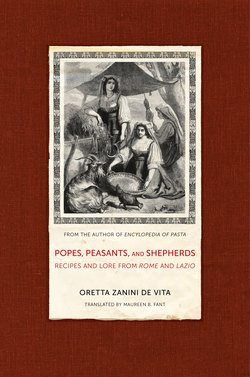Читать книгу Popes, Peasants, and Shepherds - Oretta Zanini De Vita - Страница 25
На сайте Литреса книга снята с продажи.
ОглавлениеThe Jewish Kitchen of the Roman Ghetto
Jewish food, in Rome as elsewhere, means kosher food, ancient food, food prepared according to principles laid down in the Bible, and food that still respects ancient laws regulating diet and hygiene.
Locked in the Ghetto from the sixteenth century until the middle of the nineteenth, the Jews of Rome, isolated and forced to be self-sufficient, including for food, were the most faithful keepers of the popular gastronomic tradition, which remained completely untouched by foreign influences or fashions. In fact, many recipes thought of today as typically Roman are actually of Jewish origin.
From the tenth century, after the struggle between empire and papacy, the Roman Jews were forced to live in the Trastevere quarter, around the Ponte Fabricio, which came to be called Pons judaeorum, and later crossed the river to the rioni101 of Sant’Angelo and Regola, where they built their synagogue. In 1555, a papal bull turned what had been (and is now) the Jewish quarter into a true ghetto. Jews were restricted to the area bounded by the Ponte dei Quattro Capi, the Portico d’Ottavia, Piazza Giudia (no longer in existence), and the Tiber. The territory at their disposal was a rabbit warren of little streets and alleys overlooked by insalubrious dwellings, without light and often invaded by the floodwaters of the Tiber. The quarter was locked at sunset and reopened at dawn; transit was permitted through eight gates, one of which opened opposite the church of San Gregorio della Divina Pietà. And yet, it is precisely in this ambiance, in these poor, ill-equipped kitchens, that the Roman Jewish cuisine developed. It was poor, to be sure, but rich in flavors. In it, the loving hand of the housewife, who worked the humblest ingredients into something downright appetizing, is always evident.102
Outdoor cobbler’s shop in the Jewish Ghetto in Rome (Biblioteca Clementina, Anzio)
When Rome became capital of a united Italy, the gates of the Ghetto were unlocked, but only the wealthier Jews sought to live elsewhere. The others stayed in the Ghetto, which became the Jewish quarter as we know it today. Those osterias and fraschette that kept alive the gastronomic tradition of the forefathers of today’s Roman Jews are now smart restaurants where one can taste the best products of the Roman Jewish kitchen.
In the Bible, there is everything, says the Jewish cook. Kosher cooking excludes the flesh of animals considered “unclean,” such as the pig, the hare, the rabbit, and shellfish, that is, animals that do not chew a cud and have neither hooves nor cloven hooves and fish without fins and scales. In Exodus 12 it is written, “Do not cook the kid in its mother’s milk,” so meat and dairy products must never be served at the same time, and different dishes must be used. This explains why in Jewish cooking, and Roman Jewish in particular, the use of fats is limited to oil or, in part, bone marrow. Meat is butchered according to ancient laws, by specialized butchers who must kill the animal without making it suffer and so that it loses all its blood. Only in this way can the meat be considered kosher, which is to say pure.
Like other cuisines, Roman Jewish cooking is closely keyed to religious holidays. Yom Kippur (Day of Atonement) is celebrated with sweet-and-sour red mullet and turkey meat loaf. Shavuot, the harvest feast, has sumptuous stuffed cabbage. For Hanukkah, the Festival of Lights, when one candle is lit on the
Boys taking turkeys to “pasture” through the streets of Rome (Fondazione Primoli, Rome)
menorah each day, spinach and ricotta ravioli and fried chicken are eaten. Children in particular celebrate Purim (the Festival of Deliverance) with almond sweets and struffoli (small fried dough balls coated in honey), while the traditional dish for Sukkot (Festival of the First Fruits and Vegetables) is gnocchi alla romana. Each festival has, in addition to its own menu, its own special sweets, often based on ground almonds, which, with their high oil content, can partially replace butter.
